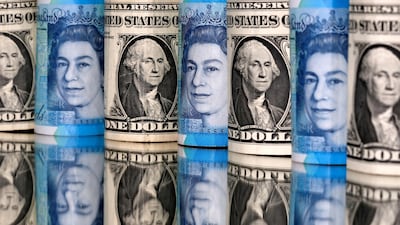The UK pound has been ‘utterly crushed’ by the Brexit trade talks, monetary policy and a US dollar shortage amid the coronavirus outbreak, according to analysts.
Sterling rallied to $1.1720 against the US dollar on Thursday at 7.10pm UAE time, after the Bank of England announced more emergency monetary measures, but is still 11.2 per cent off highs of $1.32 on March 9.
Several factors are driving sterling's move downward, said Ipek Ozkardeskaya, a senior analyst at Swissquote Bank, with the most obvious the rally in the US dollar.
"Now what fundamentally hurts the pound is the fact that the spread of the coronavirus across Europe has messed up with the timeline of the Brexit negotiations," she told The National. "With bilateral trade talks being cancelled due to the virus emergency, the probability of getting a trade deal done by the end of this year gets shattered."
The chance of securing a deal in the current climate is “next to zero”, said Jasper Lawler, head of research at London Capital Group.
“Sterling has been utterly crushed. Boris Johnson needs to do a 180 on his end-of-year deadline for Brexit to stop what is becoming a complete collapse in sterling,” he added. “Either Boris will readjust his expectations and extend the deadline by at least six months – in which case we can see a rebound in the pound towards the $1.25 level, or he will stick to his end-of-year deadline, and sterling could be further dashed towards parity against the US dollar.”
The UK pound began its slide downward as the Covid-19 epidemic gained pace and investors flocked towards safe-haven currencies such as the US dollar. The dollar resumed its relentless climb against major currencies on Thursday as wild financial market volatility and worries over tightening liquidity triggered by the pandemic sparked an investor flight into cash.
In a bear market, investors also traditionally flock to US Treasury bonds, which historically are inversely correlated to the stock markets, said Hussein Sayed, the chief market strategist at FXTM. However, this pattern changed this week as a sell-off in US Treasuries intensified leaving yields standing at 1.25 per cent.
“This kind of market behaviour is scary. It shows that investors are selling whatever they can to raise cash and this also explains why the dollar is soaring to record highs. Investors are clearly being forced to build their cash reserves to survive a prolonged period of the current pandemic,” Mr Sayed added.
UK Chancellor Rishi Sunak's "unprecedented package" of £330 billion (Dh1.39 trillion) in government-backed loans, unveiled on Tuesday, for struggling businesses affected by Covid-19, also failed to save the pound.
The UK's perceived “behind the curve” response to the crisis, as well as reduced international fund flows and Brexit uncertainty are affecting the pound's outlook, said Charles-Henry Monchau, chief investment officer and head of investments at Al Mal Capital, a subsidiary of Dubai Investments.
“The dollar is the world's reserve currency and therefore tends to benefit when demands for cash rise as is the case when uncertainty on the general business outlook rises and economies shift into recessionary territory,” said Mr Monchau.
“It is estimated that there is currently a $12tn funding gap overseas and this is creating a dollar shortage. While the move by the Fed to open swap lines to smooth out disruptions in overseas dollar markets will help, it is not sufficient at this stage and could thus create more upward pressure on the greenback.”
The UK's monetary policy decisions, including an interest-rate cut of 15 basis points on Thursday on top of a 50bps rate cut by the Bank of England last week, have also failed to bolster the pound's fortunes, said Mr Monchau. The Bank also said it would begin further easing with a £200 billion bond-buying programme.
“Bank of England governor, Andrew Bailey, just said he's willing to print unlimited quantities of money, via its new commercial paper facility, and pump in into the economy," he added.
"The pound tends to underperform when the BoE cuts interest rates and boosts quantitative easing, and we therefore expect expectations for further action to keep sterling under pressure over the near-term.”


